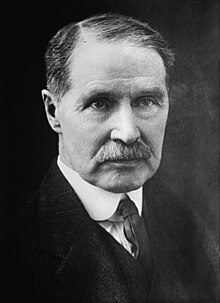Bonar Law
Bonar Law | |
|---|---|
 | |
| Prime Minister of the United Kingdom | |
| In office 23 October 1922 – 20 May 1923 | |
| Monarch | George V |
| Preceded by | David Lloyd George |
| Succeeded by | Stanley Baldwin |
| Leader of the House of Commons | |
| In office 23 October 1922 – 20 May 1923 | |
| Preceded by | Austen Chamberlain |
| Succeeded by | Stanley Baldwin |
| In office 10 December 1916 – 23 March 1921 | |
| Prime Minister | David Lloyd George |
| Preceded by | H. H. Asquith |
| Succeeded by | Austen Chamberlain |
| Leader of the Conservative Party | |
| In office 23 October 1922 – 28 May 1923 | |
| Preceded by | Austen Chamberlain |
| Succeeded by | Stanley Baldwin |
| In office 13 November 1911 – 21 March 1921 | |
| Preceded by | Arthur Balfour |
| Succeeded by | Austen Chamberlain |
| Lord Privy Seal | |
| In office 10 January 1919 – 1 April 1921 | |
| Prime Minister | David Lloyd George |
| Preceded by | The Earl of Crawford |
| Succeeded by | Austen Chamberlain |
| Chancellor of the Exchequer | |
| In office 10 December 1916 – 10 January 1919 | |
| Prime Minister | David Lloyd George |
| Preceded by | Reginald McKenna |
| Succeeded by | Austen Chamberlain |
| Secretary of State for the Colonies | |
| In office 25 May 1915 – 10 December 1916 | |
| Prime Minister | H. H. Asquith David Lloyd George |
| Preceded by | Lewis Vernon Harcourt |
| Succeeded by | Walter Long |
| Leader of the Opposition | |
| In office 13 November 1911 – 25 May 1915 | |
| Monarch | George V |
| Prime Minister | H. H. Asquith |
| Preceded by | Arthur Balfour |
| Succeeded by | Sir Edward Carson[a] |
| Parliamentary Secretary to the Board of Trade | |
| In office 11 July 1902 – 5 December 1905 | |
| Prime Minister | Arthur Balfour |
| Preceded by | The Earl of Dudley |
| Succeeded by | Hudson Kearley |
| Member of Parliament for Glasgow Central | |
| In office 15 December 1918 – 30 October 1923 | |
| Preceded by | John Mackintosh MacLeod |
| Succeeded by | William Alexander |
| Member of Parliament for Bootle | |
| In office 28 March 1911 – 15 December 1918 | |
| Preceded by | Thomas Myles Sandys |
| Succeeded by | Thomas Royden |
| Member of Parliament for Dulwich | |
| In office 16 May 1906 – 20 December 1910 | |
| Preceded by | Frederick Rutherfoord Harris |
| Succeeded by | Sir Frederick Hall |
| Member of Parliament for Glasgow Blackfriars | |
| In office 25 October 1900 – 13 January 1906 | |
| Preceded by | Andrew Dryburgh Provand |
| Succeeded by | George Nicoll Barnes |
| Personal details | |
| Born | Andrew Bonar Law 16 September 1858 Kingston, Colony of New Brunswick (now Rexton, New Brunswick, Canada) |
| Died | 30 October 1923 (aged 65) Kensington, London, England |
| Resting place | Westminster Abbey |
| Nationality | British |
| Political party | Conservative |
| Other political affiliations | Unionist |
| Spouse(s) | Annie Robley (m. 1891; died 1909) |
| Children | 6, including Richard |
| Parents |
|
| Profession | Iron merchant |
| Signature | |
| a. ^ Office vacant from 25 May 1915 to 19 October 1915 | |
Andrew Bonar Law (16 September 1858 – 30 October 1923), commonly called Bonar Law (/ˈbɒnər ˈlɔː/),[1] served as Prime Minister of the United Kingdom.[2]
Law was elected to Parliament in 1900 as a member of the Conservative Party. He became leader of the Party in 1911. He was Lloyd George's Chancellor of the Exchequer and Leader of the House of Commons while Lloyd George served as Prime Minister during World War I.
Law became Prime Minister in October 1922. He found out he had throat cancer and resigned in May 1923. He died in October 1923.
References
- ↑ "Bonar Law". Oxford Dictionaries UK Dictionary. Oxford University Press. Retrieved 21 May 2015.
- ↑ UK Parliament. "Mr Bonar Law (Hansard)". Retrieved 11 April 2020.
Other websites
 Media related to Andrew Bonar Law at Wikimedia Commons
Media related to Andrew Bonar Law at Wikimedia Commons Works written by or about Bonar Law at Wikisource
Works written by or about Bonar Law at Wikisource Quotations related to Bonar Law at Wikiquote
Quotations related to Bonar Law at Wikiquote- "Archival material relating to Bonar Law". UK National Archives.
